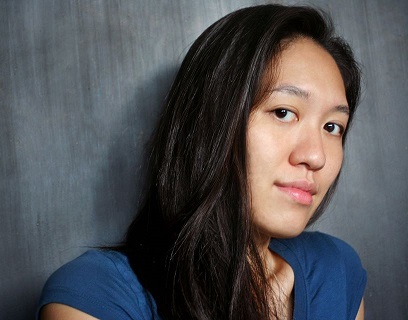Jean Lee, C ’09, arrived at Penn wanting to be a lawyer and left a burgeoning filmmaker. The moviemaking bug bit senior year, when, for her thesis project, she created an award-winning documentary—We Do Not Exist—about Philadelphia’s sex-trafficking industry. After Penn, she earned an M.F.A. from NYU’s Tisch School of the Arts, Asia, and she has had projects at Sundance, Film Independent, and the American Film Institute Directing Workshop for Women. The 28-year-old rising star is finishing Tortoise, a short starring David Arquette about a sex offender who embarks on an unexpected adventure with
his estranged daughter. Here, Lee talks about her path to filmmaking, where stories come from, and what’s on the horizon.
Q: How did you go from law to film?
I was always into the powerful impact the legal system could have on important issues. Went I got to Penn, I majored in 20th-century American literature, creative writing, and cinema studies and took some law classes. In junior year, I met Peter Decherney, a professor of English and cinema studies. He agreed to be my thesis advisor and encouraged me to make the documentary. I was interested in Penn Law’s Documentaries and the Law program and thought the film would be a foot in the door. But while making it, I realized I could make a more visceral impact on big issues through filmmaking than through some of the bureaucratic red tape that exists in the field of law. That’s how I transitioned into film.
Q: Had you had any experience making movies prior to We Do Not Exist?
I don’t know what I was thinking—I had never made a film of any kind. I had taken theory classes, but that was it. I had no experience, no equipment. Thankfully, everyone was really supportive—people at Penn’s Vitale Digital Media Lab, classmates, Professor Decherney, and so many others were all behind me.
Q: How did Penn prepare you for making films, both documentary and narrative?
I very much believe that filmmakers should get an undergraduate degree in something unrelated to film. When I got to Tisch, I was surrounded by people who had gone to film school for undergrad or who were from film families. At that point, I still didn’t really even understand the mechanics of cameras. But I had the research and analytical skills to approach a topic or story. At Penn, I really learned to think, which equipped me for anything.
Q: You’ve tackled some tough topics, from sex trafficking to pedophilia. And many of your films focus on people whom society has, in many ways, cast out. How do you come to your stories?
Where some filmmakers are consistent in style or topic, I am consistent in theme. And one of my main themes is redemption. I’m interested in marginalized, fringe communities and putting people who don’t have voices in the spotlight—or giving them a voice. So far, many of my films have been somewhat controversial, which means there’s a big chance they’re not going to be a market success. For example, with Tortoise, I tried to identify the most hateable character—a pedophile—and then ask if there’s hope for that person. Is there room for redemption, for personal connection? In the film, I look for the possibility of it, even if it makes me feel uncomfortable. And I’m always very sympathetic to the audience. But, at the same time, I also feel that just because something is taboo or difficult, it shouldn’t go unexplored.
Q: What are you working on now?
I’m writing the pilot for my first television show, an anthology called Stranger Pilgrim. Every season follows a different scientific invention and looks at whether science and faith can coexist. The first season is called Robot Courtesan. It’s at a very early stage, but I’ve had some really positive reactions. I’m excited about this piece because in theme, style and tone, it has everything I’m passionate about. And it’s actually quite marketable. There also aren’t a lot of genre-directing women—in this case sci-fi—so this would add a woman’s voice, another reason I’m excited.
Q: How will you know you’ve “made it” as a filmmaker?
There are two parts to this for me: First, if I’ve satisfied my own vision in my projects. Second, if I’ve raised awareness or discussion or inspired people to think beyond the films. For me, it’s not just about entertainment, but whether I’ve made a difference in someone’s life or perspective. All that and [laughing] if I make Robot Courtesan before I turn 30!




